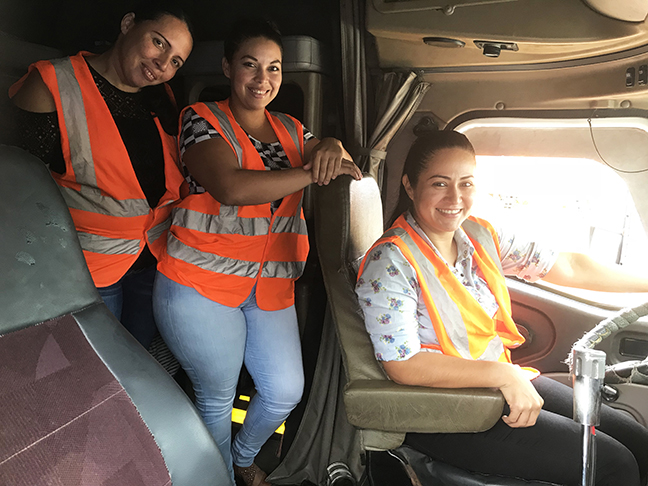Women are disproportionately affected by poverty, according to the United Nations, which reported that the pandemic was expected to increase the poverty rate for women and widen the gap between men and women who live in poverty. Since 1982, Food For The Poor has been working tirelessly to lift the poor out of poverty, giving the tools to make sustainable changes that will benefit their families and communities. This includes reducing inequality and not just providing food and clean water, but also providing education to empower the poor and help them break the cycle of poverty.
Well-Paying Jobs Are Out Of Reach For Many Honduran Women
Honduras has a huge commercial driver shortage. In fact, The Honduran National Institute of Statistics estimates that Honduras experiences a shortage of more than 5,000 certified truck drivers per year. As a result, trucking companies are unable to operate at full capacity. The demand for certified drivers for buses and trucks is growing in Honduras, as roads have been improved.
In 2021, to celebrate International Women’s Day, Food For The Poor donors blessed 25 women with scholarships to the Puerto Cortes Transportation School, a school established by donors to help combat the commercial driver shortage in Honduras. Prior to scholarships from FFTP, many women who were enrolled were forced to drop out to obtain a temporary job to make ends meet for their families. Women were losing economic opportunities because they just couldn’t make ends meet while they obtained the training for a well-paying job.
Providing A Scholarship and Stipend Made All The Difference
As part of the scholarship, in addition to the four-month certification, participants also received a $125 monthly stipend and a monthly food basket, allowing them to stay enrolled while still providing the basics for their families.
The certification requires completion of more than 700 hours of coursework, including time and training on the road with a certified driver, and classes in computer skills, first aid and CPR, and human development. Upon graduation, certified drivers in Honduras can earn about $700 a month, well above the minimum wage of $375 per month.
FFTP donors fund scholarships through two programs – the Women’s Empowerment Scholarship and another one provided to men and women. The school has certified 35 women, and 13 more are in the process of certification. Of the 35 women who have already completed their schooling, 21 are already working.
Women In El Salvador Were Given the Means to Cultivate Vegetables
Food For The Poor’s work in Honduras with the Puerto Cortes Transportation School is just one example of how the charity is empowering women on a global scale to lift their families from poverty and provide greater economic opportunities for them.
This March, on International Women’s Day, the charity spotlighted women in El Salvador who are growing food in macrotunnels thanks to the generosity of FFTP donors. Fifteen women were provided with the tools, education and training necessary to cultivate vegetables. The crops are grown in greenhouse-like structures called macrotunnels engineered by in-country partner New Horizons For The Poor Foundation and are made from materials that create the ideal growing conditions.
Despite setbacks caused by the COVID-19 pandemic and threats to the crops from Tropical Storm Amanda in May 2020 and back-to-back Hurricanes Eta and Iota several months later, the women continued to work diligently to make sure their crops stayed healthy.
The women made more than $5,400 for all three harvests of tomatoes and peppers from April 2020 to January 2021. They are using the profits to reinvest and expand the project to grow even more vegetables.
How Can You Help?
Helping women and their families rise from poverty isn’t just a once-per-year endeavor. Food For The Poor has worked for 40 years to do more than feed millions of hungry children and families living in poverty primarily in 17 countries in Latin America and the Caribbean. They’ve worked to provide emergency relief assistance, clean water, medicine, educational materials, homes, support for vulnerable children, care for the aged, skills training and micro-enterprise development assistance.
This spring, Food For The Poor announced a new program, Seven Saves. It’s a grassroots program for church communities that puts faith into action among your congregation, helping individuals engage with the problem of extreme poverty. Seven Saves is good for the poor, but also makes good things happen in your church like the shared goals that build community and keep your congregation working together and actively invested in outcomes.
This new initiative is a robust “plug-and-play” initiative that provides you with planning, resources, and church-wide elements with no commitment of church budget.
Learn more about how your church can get involved at SevenSaves.org.

